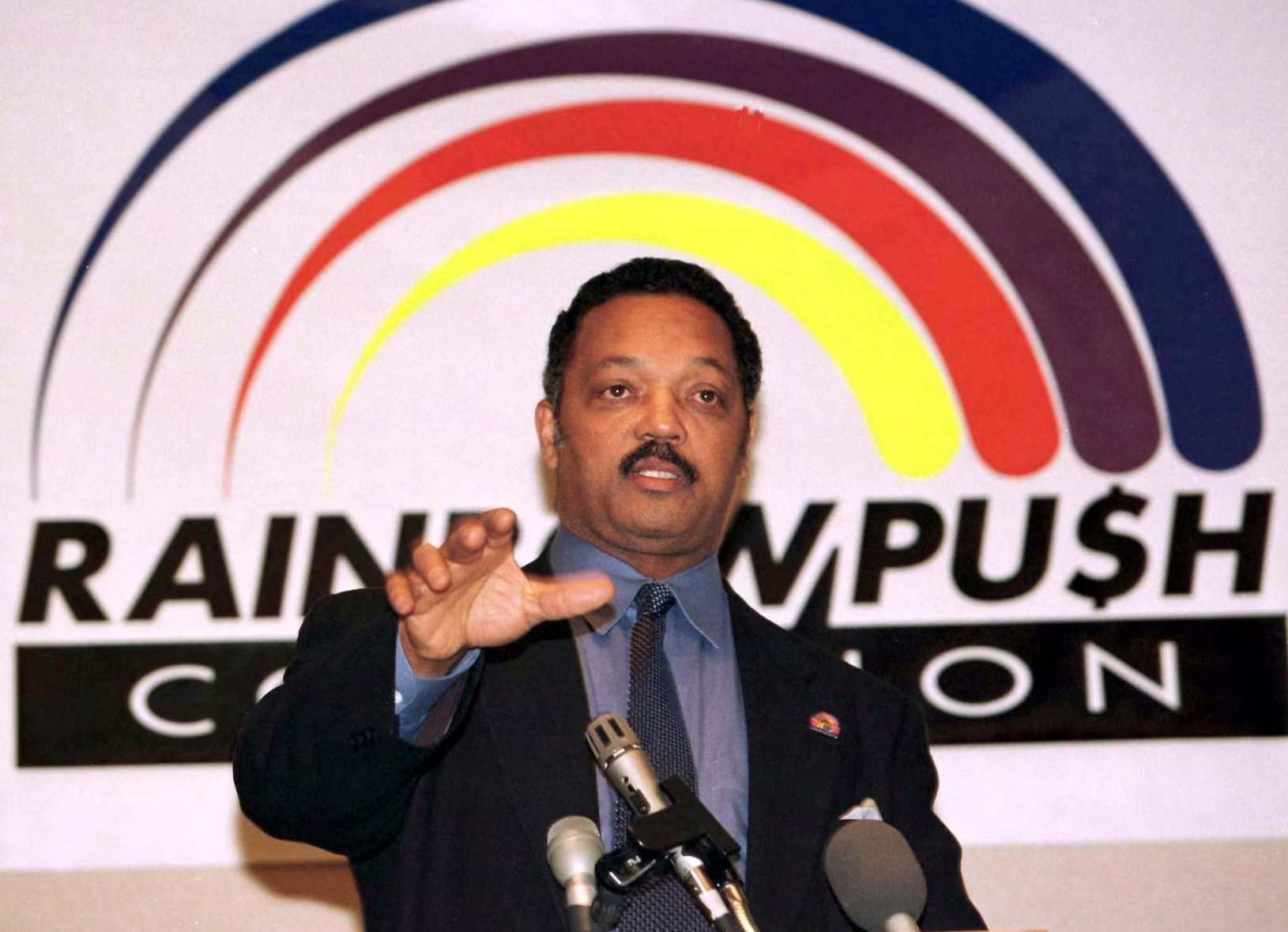Rev. Jesse Jackson: Remember, then Resolve to Act
February 21, 2026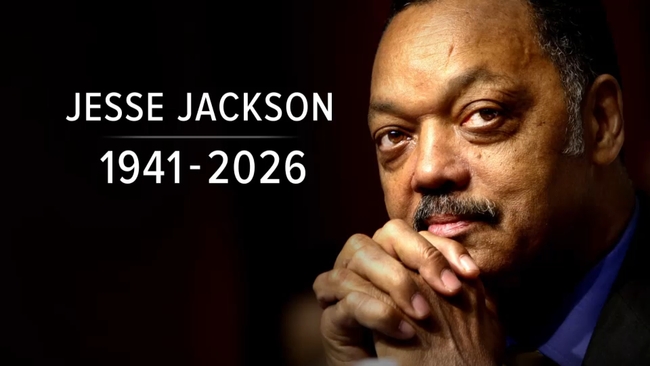
The outpouring of remembrance and tribute to the Reverend Jesse L. Jackson upon his death last week at age 84 was reverent, expansive, and tinged with a sense of bitter wistfulness for a time not so long ago when advocacy for civil rights and equal opportunity had his loud, strong and affirming voice, inspiring many others to stand up and march for the cause of racial justice. As I watched and read the many glorious and heartfelt tributes, I could not help but feel a real sense of loss not simply for this one great leader vanishing from our midst, but perhaps even more intensely, for the loss of courageous leadership and clear direction for the continuing struggle for civil and human rights in this nation as well as globally.
Heir to the mantle of the Reverend Dr. Martin Luther King, Jr., Jesse Jackson was the last of the great leaders bridging the pre-and-post-eras of the Civil Rights Movement from the 1960s to today. While there are still many strong Black champions of justice and equal opportunity, their voices often seem muted and muffled in the cacophony of this nation’s sharp turn to the right, led by a loud and raucous political marching band whose drums sound a message of retreat, revision and rolling back to a time before the hard-won gains of the Civil Rights Movement.
The most shocking part of the current era is the ways in which white supremacy is mis-appropriating the language and laws of civil rights, claiming, for example, that White men are the ones suffering discrimination, that DEI practices are harmful rather than essential to building peaceful communities, that the playing fields for entrance to college or professions are all perfectly equal when they are not. Almost as shocking, however, is the fact that there has not been a loud, courageous, compelling response to these current assaults on civil rights, and instead, too many leaders seem to be turning away from any confrontation, hiding under their desks hoping against hope that the authoritarian wave will eventually go away.
Jesse Jackson, afflicted with the debilitating effects of Parkinson’s that eventually took his life, could no longer lead the fight. There are leaders around the country who are rising in the political sphere, but no clear successor. Certainly the Reverend Al Sharpton is one of the most prominent current leaders, but we also need to develop a new generation. Former Vice President Kamala Harris fought a good fight as a presidential candidate but has been undermined by many in her own party. Governor Wes Moore of Maryland, the only Black governor among the 50 states, has spoken eloquently in recent weeks after the current president trashed him while disinviting him from a dinner for governors at the White House. “You do not determine my worthiness,” Moore declared, also saying, “I will bow down to no one.” Senator Cory Booker, Senator Angela Alsobrooks and Representative Jamine Crockett are promising rising leaders, and Stacey Abrams remains an important voice. But who will truly be able to take up the national cause to restore civil rights and justice in this nation?
As we look to the future, we also must realize that this new age requires more education for the rising generations. A student wrote to me last week that she had not heard of Jesse Jackson before the news of his death. While startled, I realized that our youngest students were born in the last two decades, times well past the Civil Rights Movement of the 20th Century, times more recently characterized by economic stress, pandemic and rising authoritarianism. We educators have huge challenges to acquaint rising generations with not only the knowledge but also the know-how to tackle civil and human rights threats in the current political climate.
I asked members of the Trinity community to share their thoughts about Reverend Jackson, and here are their responses:
Tiara Johnson, SPS Student in Business Administration:
“I had the immense privilege to meet Jesse Jackson when I was just a baby, shortly after he announced his presidential candidacy in 1988. During a campaign event in Washington, DC, my mother held me as he moved through the crowd and briefly picked me up and kissed me. Although I do not remember the moment, I now understand its significance. His campaign represented hope and possibility, and that encounter reminds me that I was present during a historic movement for change and opportunity.”
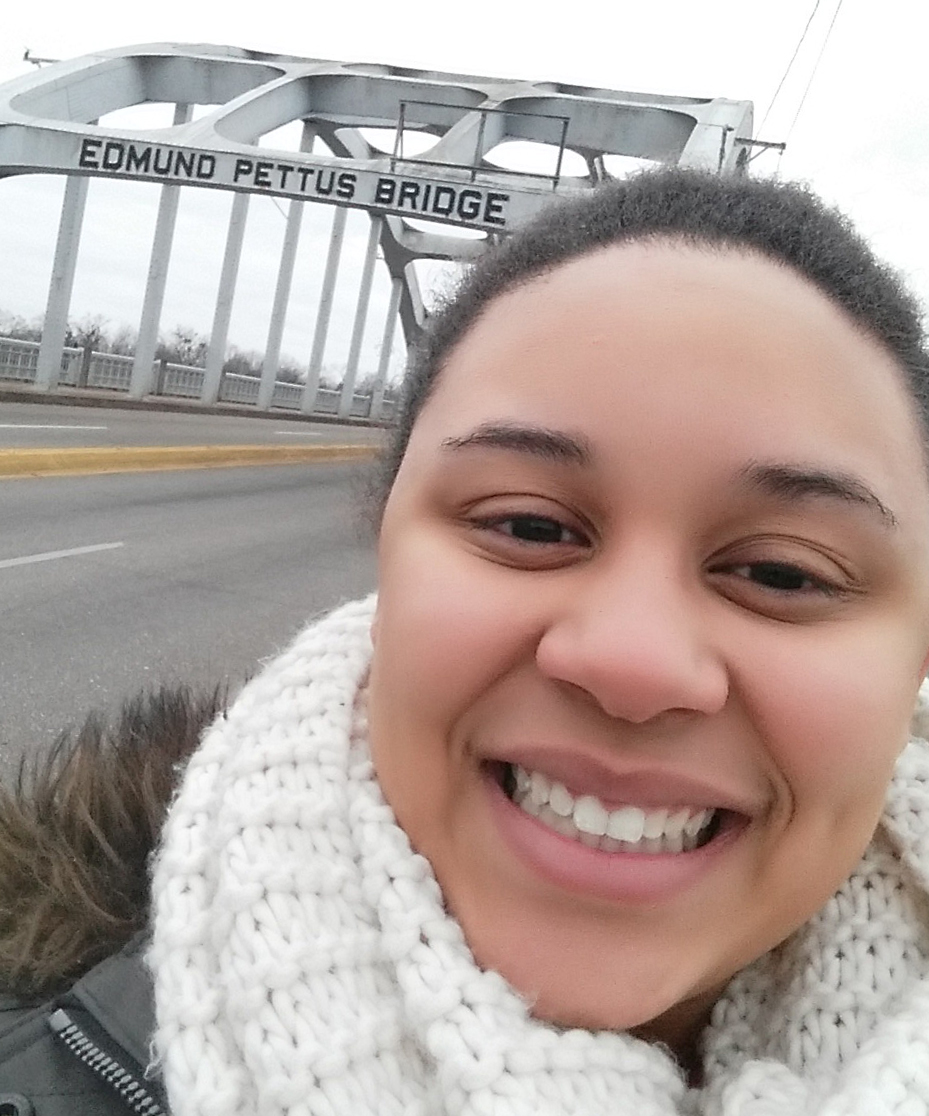
Anna Roland ’16
Director of Alumnae/i Affairs:
“Growing up, I knew Rev. Jesse Jackson was a significant figure in Civil Rights history, but I truly grasped the impact of Rev. Jesse Jackson’s legacy during Trinity’s Spring mission trip to Selma, Alabama. Standing on the Edmund Pettus Bridge and hearing firsthand accounts of “Bloody Sunday” from community members gave me a deeper understanding of the courage and conviction it took for leaders, like him, to stand firm in the face of injustice and demand change.”
Dr. Patrice Moss, Professor of Biochemistry:
“…my father in love said this and I think it sums up exactly what I feel… “You served us well Rev. Jackson. Now take your rest in glory!!” Rev. Jackson’s life is reflected in 2 Tim 4:7-8 “I have fought the good fight, I have finished the race, and I have remained faithful. And now the prize awaits me—the crown of righteousness, which the Lord, the righteous Judge, will give me on the day of his return. And the prize is not just for me but for all who eagerly look forward to his appearing.” Thank you for honoring this great man of God!
Dr. Lisa Simmons, Program Director for the Masters in Occupational Therapy:
“I was saddened to hear about Rev Jesse Jackson’s passing. In college, I went to hear him speak and it was the first time I registered to vote. I registered to vote in Alabama based on that speech. I am PROUD to say I voted in 2000 to legalize interracial marriage in the state of Alabama. Sad that it took that long to legalize it, and so happy Rev Jackson came to Tuskegee University and mobilized us to remove an injustice.”
Evelyn Alobwede ’28, CAS Student:
“…learning about his death it made me think of how he made every moment count. Let us never forget him and all the others came before him.”
Dr. Raena Barnes, Assistant Professor of Nursing:
“I had the great honor of meeting him when he was running for president ( our office was located next to CNN) He was very personable and very kind to all of us- our office was evacuated for a fire drill and he made a point to see that we were all ok.”
Dr. Stephen Thorne, Distinguished Professor of Education, reminds us of Rev. Jackson’s famous and beloved affirmation poem:
I am Somebody!
I may be poor,
But I am Somebody.
I may be young,
But I am Somebody.
I may be on welfare,
But I am Somebody.
I may be small,
But I am Somebody.
I may have made mistakes,
But I am Somebody.
My clothes are different,
My face is different,
My hair is different,
But I am Somebody.
I am black,
Brown,or white.
I speak a different language
But I must be respected,
Protected,
Never rejected.
I am God’s child!
Watch Rev. Jackson on Sesame Street
Read this great tribute to Reverend Jackson by Associate Dean Jamal Watson:
The Dreamer Who Would Not Wait: Reverend Jesse Jackson and the Unfinished Work of Access
Continue reading →Read comments (1) Add CommentA Government Without Newspapers
February 16, 2026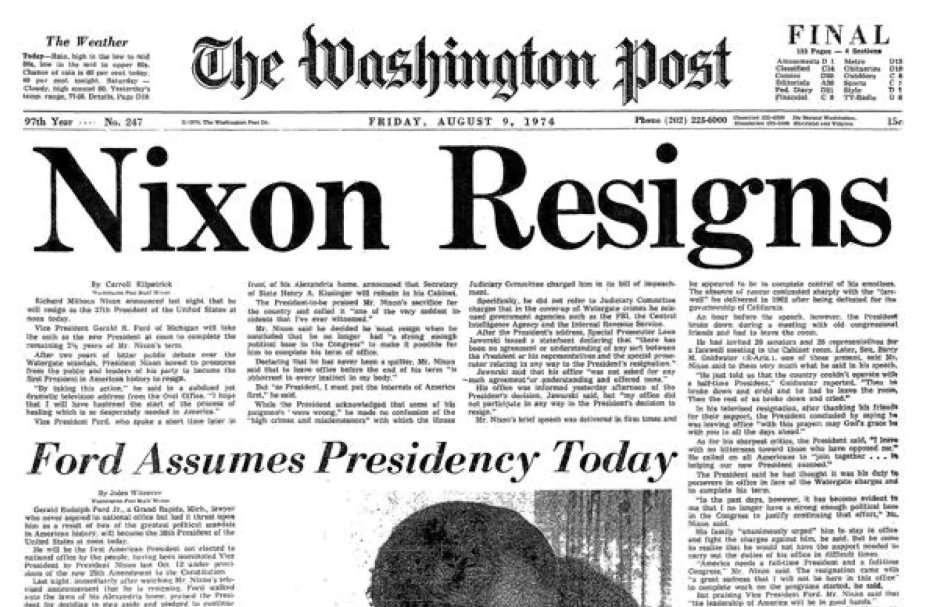
“The basis of our governments being the opinion of the people, the very first object should be to keep that right; and were it left to me to decide whether we should have a government without newspapers or newspapers without a government, I should not hesitate a moment to prefer the latter. But I should mean that every man should receive those papers & be capable of reading them.”
– Thomas Jefferson, Letter to Edward Carrington, January 16, 1787
I am old enough to remember standing in Lafayette Park across from the White House on August 9, 1974, watching then-CBS News White House reporter Dan Rather standing on a wooden crate while broadcasting the extraordinary news: President Richard Nixon had resigned from the presidency and was leaving the White House immediately! Rather announced that Nixon would leave from the south lawn of the White House, so with thousands of others I rushed down 15th Street to get to the Ellipse — it was easy to get around the White House block in those days — and as Nixon’s helicopter rose from the lawn a strange silence came over the crowd and then thousands of arms raised up waving goodbye to the person who, at that time, was the most hated president in American history.
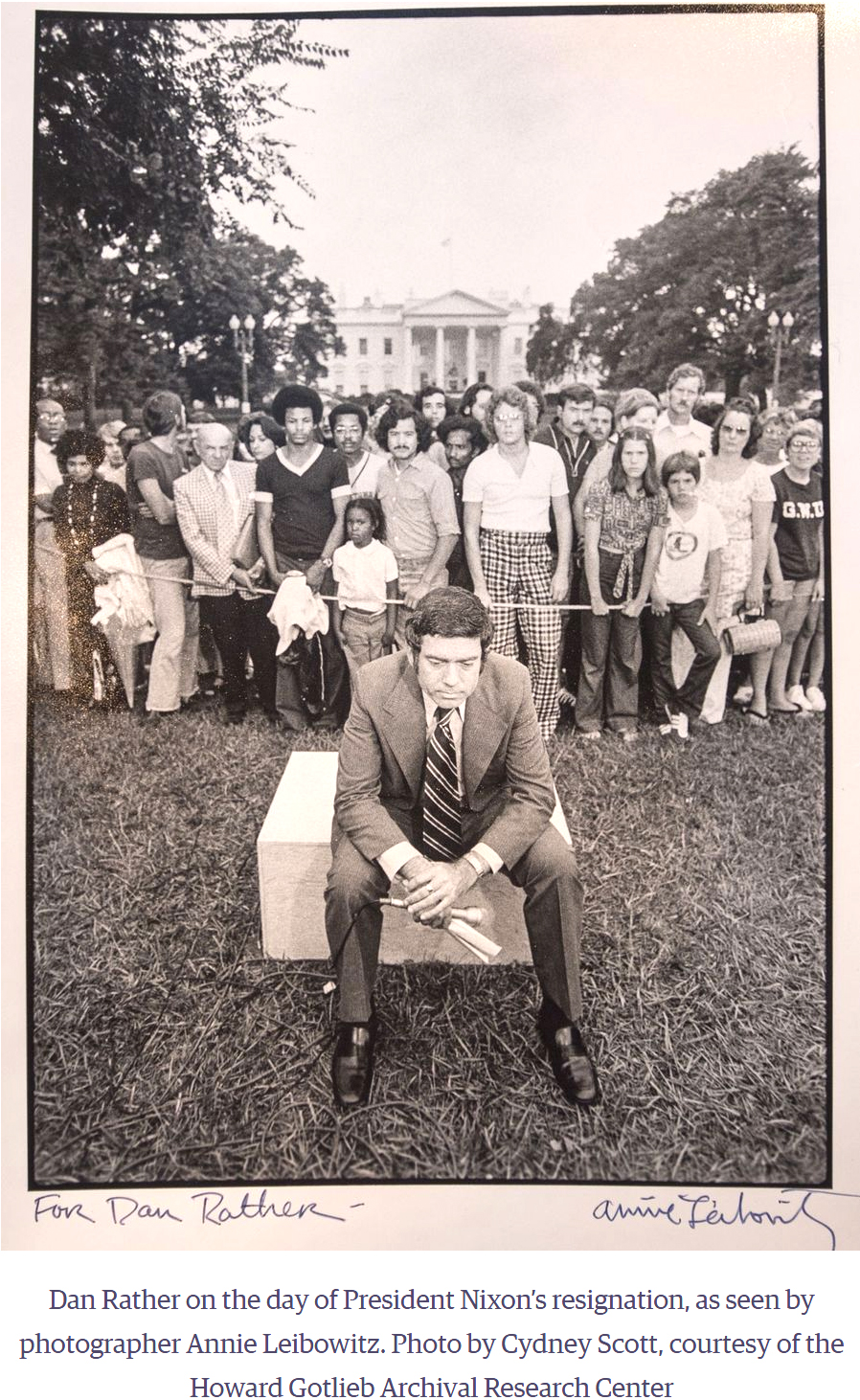 A confluence of many factors forced the resignation of Richard Nixon: a bumbling “third rate burglary” of the Democratic National Committee office in the Watergate apartment complex by agents of Nixon’s campaign for re-election to a second term; a staunch chairman of the Senate Watergate Committee, the formidable Senator Sam Ervin; courageous testimony of Nixon aides revealing a secret audio taping system in the Oval Office; a Supreme Court that knew its real role in the balance of powers rejecting Nixon’s claim to “executive privilege” for the tapes (U.S. v. Nixon).
A confluence of many factors forced the resignation of Richard Nixon: a bumbling “third rate burglary” of the Democratic National Committee office in the Watergate apartment complex by agents of Nixon’s campaign for re-election to a second term; a staunch chairman of the Senate Watergate Committee, the formidable Senator Sam Ervin; courageous testimony of Nixon aides revealing a secret audio taping system in the Oval Office; a Supreme Court that knew its real role in the balance of powers rejecting Nixon’s claim to “executive privilege” for the tapes (U.S. v. Nixon).
But none of these factors might have brought down the president without one central driving force: the relentless investigatory work of reporters at the Washington Post — Bob Woodward and Carl Bernstein — and the courageous backing they received from their Editor-in-Chief Ben Bradlee and Publisher Katharine Graham.
The recent shocking evisceration of the newsroom at the Washington Post — nearly half of the reporters were fired, the sports and books sections closed, international reporting gutted, Metro gone, and so much more — evoked memories of the years when that legendary newspaper and others proved the truth of Jefferson’s statement about the critical role of newspapers in maintaining a strong, functional democracy. Democracy thrives when information and knowledge are freely available to the people, and at their best, newspapers and other media outlets hold government accountable to the people by reporting facts about official actions.
Without a strong and courageous Washington Post, Nixon might have remained in office and the course of history in that era would have been very different.
Without the courageous stance of the New York Times in publishing the Pentagon Papers, the American people never would have known about the decades of official lies and deception that fueled the Vietnam War and America’s failed strategy in southeast Asia.
Without the tenacity of the Boston Globe investigative team uncovering decades of child abuse in the Catholic Church, the world might not have learned about the horrific scandal involving thousands of priests and the cover-ups by the hierarchy.
From the fearless investigative work of Ida Tarbell at the turn of the 20th Century exposing the abuses of Standard Oil and John D. Rockefeller, to the exposure of the NSA’s surveillance program, to the “60 Minutes” news magazine report on Big Tobacco’s manipulation of smokers’ cravings, to the reports on Harvey Weinstein that led to the #MeToo movement on sexual assault — and so much more — newspapers and media broadly have long played a vital role in keeping the American public informed while lifting up and rooting out corruption in government and major corporations.
A century or more of courageous journalism now appears at-risk. The decision of the Publisher of the Washington Post Will Lewis (now former publisher) — a decision presumably blessed if not ordered by Post Owner (and Amazon billionaire) Jeff Bezos — threatens to accelerate a decades-long decline in newspapers. One study reports that more than 3,500 newspapers have shuttered since 2005, eliminating several hundred thousand jobs.
Corporate executives like Bezos and Lewis claim that newspapers are dinosaurs, that new digital media platforms are the reasons for the deaths of traditional ink-and-paper broadsheets. That is too facile an excuse. The best newspapers long ago adapted to the digital age; blaming technology for a mercenary corporate decision devoid of journalistic values is a cop-out. Moreover, their claim that the newspaper needs to do a better job figuring out what people want to read is ridiculous. Just as students don’t know what they don’t know, and need to study the broad range of disciplines in core curricula to become at least semi-literate, so, too, newspaper readers don’t go looking for affirmation but rather discovery. We want to learn more about what we don’t know, read stories about people who are not like us, consider ideas that never occurred to us or that might infuriate us but at least challenge us to think and reconsider our own ideas.
The real risk of this era in free press and media more generally lies in the phenomenon of voracious corporate interests — especially technology titans — gobbling up news media outlets. Newspapers, broadcast networks, social media such as X or Facebook — all have fallen victim to owners whose financial and political interests are at odds with maintaining a free and robust independent press. Watching what is happening to the storied “60 Minutes” investigative program on CBS News, for example, is simply painful as the new corporate ownership stifles coverage that criticizes the current administration. The Washington Post lost tens of thousands of subscribers with its rightward trends over the past year. Far from sustaining nonpartisan and independent judgment among journalists, the corporate ownership interests curry favor with politicians who sit in judgment on their business relationships and governmental contracts.
Beyond the loss of jobs and information about our local communities as media outlets shrink, the even more serious problem with the demise of newspapers and independent media — and, in particular, the debilitation of the Washington Post — is the challenge inherent in Jefferson’s message of 1787. Government needs a vigorous and independent press to keep it honest, to hold it accountable, to rein in power grabs, to challenge rising authoritarianism.
This nation is living through one of the most dangerous moments in its history, an era when we could lose the freedoms and rights that so many people fought to achieve and sustain across the 250 years of our history. Without a strong and even aggressive free press reporting on the issues of this era, the authoritarians in government will push even harder on their agenda to weaken our democracy and secure their own power for years to come.
Jefferson’s last phrase in the quote at the top of this blog is particularly important right now: “I should mean that every man should receive those papers & be capable of reading them.”
A well-educated population, consistently and routinely informed by the free press, is essential for the health and vitality of any democracy. At the same time as the press is undergoing a debilitating transformation into some kind of mouthpiece of corporate owners, education is also under assault by a political administration that seeks to dictate curricula and limit academic freedom. The combination of weak press and stifled universities will spell disaster for this nation if we don’t wake up soon to reclaim the voices and venues that nurture democracy and freedom.
A government without newspapers is a tyranny. Read your history to learn more about what happened when the press and universities were suppressed in places where tyranny arose; start with 1930’s Germany or the rise of the Soviet Union.
And watch these movies:
Becoming Katharine Graham (2025)
The Post (2018)
Frost/Nixon (2008)
All the President’s Men (1976)
Continue reading →Read comments (1) Add CommentRacist Tropes and Hard American Truths
February 7, 2026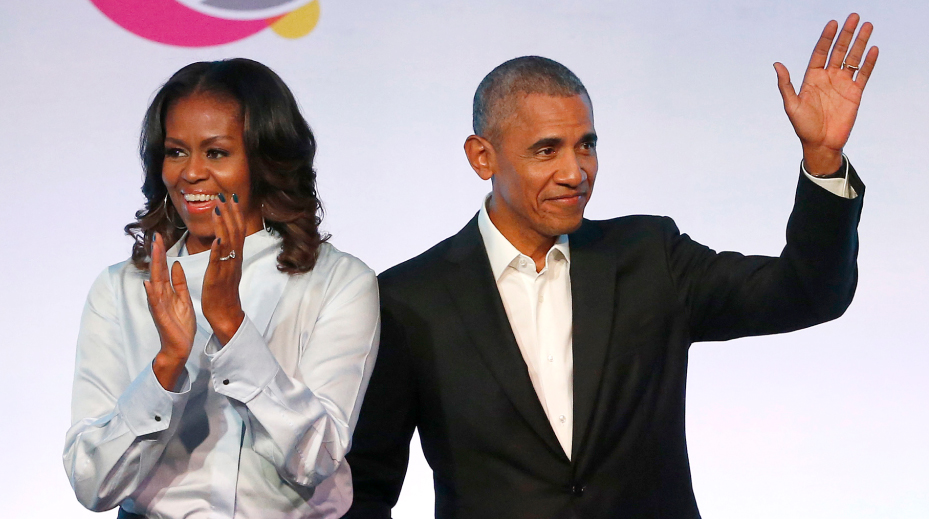
The current president of the United States chose to launch Black History Month by publishing a despicable racist trope on his paradoxically-named “Truth Social” account. Predictably, his utterly amoral band of obsequious staffers immediately started spinning ridiculous lies to cover-up the obvious ugly racial attack on former President and First Lady Barack and Michelle Obama. The images are all over the news and I will not amplify them here. Suffice to say that the images recall and echo some of the worst eras of American history, times when public imaging about Black persons as inhuman, animals, distorted caricatures prevailed in media and discourse among too many segments of American life.
The president is notoriously agnostic about history. The hard truth about American history is that this nation’s founding was crafted in large part in reliance on an economy where the enslavement of Black persons made the wealth of landowners possible. Founders including Thomas Jefferson, George Washington, James Madison and others could not bring themselves to imagine freeing their own slaves, even though they acknowledged the moral depravity of slavery. Most of the first ten presidents of the United States owned slaves. The notorious “3/5 compromise” in the original Constitution approved in 1789 counted slaves as 3/5 of a person for the purpose of calculating populations in states for representation in Congress — with southern states wanting all slaves counted at 100% while northern states, mindful of the large number of slaves in the south, did not want the southern states to be able to count all of their slaves fully. The fact that this nation was created on a principle that accepted Black bodies as fungible for political apportionment tells us all we need to know about the deep and lasting racism of the founding moment.
It took a bloody Civil War nearly a century after the founding of the United States to liberate the slaves, but the Emancipation Proclamation and end of the Civil War did not end American racism. In fact, in the subsequent century, the racial hatred that lies deep in parts of this country flourished, and white supremacy fueled the idea of the “lost cause” seeking to reclaim a time when privileged white men ruled supreme. The Civil Rights Era of the mid-20th Century had some landmark moments that we all thought were permanent markers on the road to change in racial justice — Brown v. Board of Education in 1954 declaring an end to racial segregation in schools; the Civil Rights Act of 1964 and Voting Right Act of 1965, both reinforcing the rights of Black persons to participate fully in American life.
Now comes a president and a regime whose slogan — “Make America Great Again” — is clearly a clarion call to roll back the clock to a time before the Civil Rights progress of the last century, possibly a time even before the Civil War. The shameful, demented racist tropes that the president published on Thursday night this week were only the latest in a long series of hostile actions against long-settled racial equity and justice gains in this country. The current president’s hostility to Black persons has been well-known throughout his professional life.
The president has directed numerous racially offensive official actions. He has issued direct orders to obliterate public displays of American history about slavery and the official and cultural injustices suffered by African Americans. Just weeks ago, in late January, in response to a presidential executive order, the National Park Service removed an exhibit about slavery from the Independence Mall in Philadelphia. This statement by the Organization of American Historians says it all:
“The now-removed exhibit explored the central paradox between slavery and freedom in America’s founding—between the articulation of inherent principles of liberty in the Declaration of Independence and the reality of a deeply entrenched system of human bondage. …
“The Organization of American Historians condemns the removal of the Freedom and Slavery exhibit, and as we have stated before firmly reject “federal actions and the systemic efforts to distort the historical record and impose through executive orders and actions a narrow vision of the American past.” The removal of the Freedom and Slavery exhibit undermines historical integrity, public trust, and the long-standing interpretative mission of the National Park Service at one of its most important and visited historical sites. Removing information about slavery from Independence National Historical Park is a fundamental misrepresentation of the social, economic, and political realities within which the Founders—and the nation at the time of its formation—debated independence and self-government.
“The exhibit removal must be understood in the context of a broader and deeply troubling and dangerous pattern. Throughout the past year, the Trump administration has pursued an agenda of interference in the public presentation of American history including through federal websites, cultural institutions like the Smithsonian, and throughout the National Park Service. It has routinely politicized and taken steps to distort or erase entirely from public view evidence-based historical information. At stake is the core democratic principle that the public has a right to an honest, accurate account of its nation’s own history, free from political censorship or manipulation. Historical knowledge is a shared civic resource and a bedrock of accountability. Government suppression of the facts of history for political and ideological ends is a practice of authoritarianism.”
The egregious political attacks on racial justice do not stop there. The political regime has gone after the Smithsonian Institution repeatedly, demanding that exhibits be taken down or changed to remove the truth about America’s racial history.
Even more, the administration has pursued a protracted and extraordinarily damaging campaign against DEI — diversity, equity and inclusion — practices that have long sought to achieve a measure of leveling the playing field for persons of color in education and employment. Disparaging and demanding an end to DEI practices has had a profoundly damaging effect on equal opportunity for Black and Brown persons in America, and sends a clear message that such persons cannot rely on their schools or employers to support them as they break barriers of access and participation in each new generation. The loss for our nation is incalculable in rising racial animus and opportunities diminished for millions of Americans.
The administration has mis-appropriated and misused Civil Rights laws to twist them against opportunities for persons of color and even perpetrating real harm against institutions devoted to equal justice. While misusing claims of anti-semitism to attack and debilitate major universities, the administration has thwarted higher education’s initiatives to achieve racial justice by demanding an end to DEI practices in higher education (a recent judicial ruling slows down the anti-DEI orders) and ending an important program of grant support for Minority Serving Institutions with a completely wrong reading of the Supreme Court’s ruling in the Harvard admissions case. (As a Predominantly Black Institution, Trinity received funding through the MSI program that supported our laboratories, faculty development, academic advising and other work that had a distinctively positive effect on student outcomes. That funding has been eliminated entirely.)
The administration’s war against immigrants also has a distinctively racial tone, focusing largely on Latinos for deportation while also according refugee status to White South Africans. The appalling use of federal ICE agents in Minneapolis started with the president’s contemptible attacks on the Somalian community there, calling them “garbage” and denouncing their contributions while alleging widespread fraud in public programs. The majority of Somalis in Minneapolis are American citizens. The subsequent violence including the deaths of two American citizens who were protesting the ICE actions is a consequence of the virulent racism that fuels the anti-immigration movement.
Beyond public policy actions, the current president also has a track record of dismissing Black executives from leadership positions in government, calling Black and Brown persons disparaging names and fostering an environment where racial animosity can flourish.
Not surprisingly, the current president takes no responsibility for his words and actions. Regarding the contemptible racist trope about the Obamas yesterday, he dismissed it as the work of a “staffer” and said he would not apologize. His moral failures are well known. These are the words and works of someone whose lack of mature emotional control is evident every day, someone who knows nothing about the responsibilities of leadership for a great nation.
We face a grave test of our commitment to the true value of social justice, the fundamental faith teaching about the dignity and worth of all human life. Racism is a direct attack on human dignity and a rejection of social justice.
How can this nation dare to plan its 250th birthday with this shameful stain on our current life in these United States? Are we really going to ignore the terrible reality of presidentially-encouraged toxic racism today while sitting back to watch an Indy car race around the monuments and a UFC fight on the White House lawn and call that a celebration of 250 years of this experiment in Democracy while the hard won gains of two and a half centuries fall apart?
We, the People, must deal with the core problem of this time in American history — the obvious and protracted assault on our values, justice and freedom for all — sooner than later. A hard American truth is that too many of us are looking the other way, not wanting to deal with this crisis.
Wake up, America!! Our values, our very basis as a nation devoted to “life, liberty and the pursuit of happiness” for all is at stake. We must insist that Congress and the Courts find their spine, remember their responsibilities to us, and act accordingly to restore dignity, sanity and a clear respect for law and justice in the nation’s highest office.
Continue reading →Read comments (3) Add CommentThe Value of a College Degree: Dean Christine Carrino Gorowara Commencement Remarks
February 6, 2026
Remarks for January 2026 Commencement
Dean Christine Carrino Gorowara
School of Education
Welcome and congratulations, graduates! And welcome families and loved ones who are here to support them!
Today we celebrate our graduates, because you have done something special and important – you have earned a college degree. This is something only about one in three Americans have done. Some of you have actually earned a second college degree, something fewer than one in six Americans have done.
Now it seems like we have been hearing more questioning in recent years about whether a college degree is worth it. And mostly when people ask that, they mean is it financially worth it – will the time and effort and money you invested in getting a college degree pay off in the form of greater earnings in the future.
By the way, the answer to that question is still, in most cases, yes, a college degree is worth it financially.
But we might think about whether a college degree is worth it by other measures. Here’s what I would ask: how did earning this degree change your life?
I saw this interesting thread on Reddit that asked people to describe their life in five words.
Some people chose five things they were or things they did, like:
- Wife
- Mother
- Teacher
- Swimmer
- Reader
Some people chose five adjectives, like:
- Adventurous
- Love-filled
- Authentic
- Messy
- Hopeful
Some made a five-word phrase, like:
- Work
- Eat
- Sleep
- Rinse
- Repeat
Or:
- Bad
- Jokes
- And
- Awkward
- Moments
Some were kind of meta, like:
- I
- Never
- Finish
- Anything
So how is the five-word description of your life different because you have earned a college degree?
Maybe as of today, your five words would be the qualities you discovered in yourself as you were studying for your degree while balancing school with work and family responsibilities:
- Resilient
- Persistent
- Intelligent
- Disciplined
- Resourceful
Maybe they describe how you now see your future:
- Doing
- A
- Job
- I
- Love
Or:
- Life
- Is
- Full
- Of
- Possibility
Maybe they reflect ways you have come to see yourself:
- Learner
- Analyzer
- Professional
- Leader
- Expert
Think about your five words, and how they are different today from what they would have been before you came to Trinity. Whatever they are, know that from this day forward, they will be linked in some way to these five words:
- I
- Earned
- A
- College
- Degree

Lean Into Compassion: Dean Brigid Noonan Commencement Remarks
February 4, 2026
Remarks for January 2026 Commencement
Dean Brigid Noonan
School of Nursing and Health Professions
To the Class of 2025 – Congratulations!
To your families, your friends and your faculty … thank you for supporting these individuals!
Today we gather to celebrate you. This moment represents years of late nights, early mornings, challenging exams, difficult conversations, missed time with family and friends, and countless hours spent learning how to care for others. Whether you are graduating from nursing, occupational therapy, public health, or counseling—at the undergraduate or graduate level—you share something powerful in common: you have chosen a profession rooted in service, humanity, and at a time that we need it badly … HOPE!
You are entering fields that do not exist at a distance from people’s lives. You will be invited into moments of vulnerability, uncertainty, transition, and healing. You will meet individuals, families, and communities at their best—and at their most fragile. That responsibility is an honor, a privilege and a calling.
As you step forward into your professional lives, I want to offer three commitments to carry with you: lean into compassion, continue to develop empathy, and always remain a lifelong learner—especially when you think you don’t need to be.
First, lean into compassion.
Compassion is not passive. It is not simply feeling for someone—it is choosing to act with care, dignity, and respect even when it is difficult and incredibly challenging. Compassion shows up when systems are strained, when resources are limited, when time is short, and when answers are unclear. It shows up when burnout whispers that it would be easier to disengage.
Leaning into compassion means seeing the person behind the chart, the diagnosis, the referral, or the statistic. It means recognizing that every individual you encounter carries a story shaped by culture, experience, trauma, resilience, and hope. Your technical skills will, of course, matter deeply—but your compassion will often matter more.
Second, continue to develop empathy.
Empathy is not a skill you master once; it is a practice you return to again and again. It requires humility and grace—the willingness to listen more than you speak, to suspend judgment, and to acknowledge what you do not know.
As professionals, you will gain expertise. You will earn titles and credentials. And yet, empathy asks you to remain open—to recognize that an individual’s lived experience is a form of knowledge no textbook can fully capture. Developing empathy means staying curious about perspectives different from your own and honoring the voices of those you serve as partners in their own care, healing, and well-being.
Empathy is also essential for how you treat one another and yourselves. Extend it to colleagues navigating stress, to students who will one day look to you as mentors, and to yourself when the work feels heavy.
Finally, always be a lifelong learner—even when you think you don’t need to be.
The fields you are entering will change. Evidence will evolve. Best practices will shift. New challenges will emerge that demand creativity, critical thinking, and courage. Lifelong learning is not about collecting credentials—it is about staying responsive, reflective, and responsible.
Perhaps most importantly, learning keeps you grounded. It reminds you that expertise does not mean certainty, and leadership does not mean having all the answers. The moment we believe we have nothing left to learn is the moment we stop growing—and in professions like yours, growth is essential to ethical and effective practice.
Remember, the world you are entering needs you—not just your knowledge, but your values. It needs professionals who lead with compassion, practice empathy with intention, and commit to learning for a lifetime. It needs you to be courageous advocates, thoughtful collaborators, and steadfast servants of the public good.
As Wilfred Peterson said: “The world needs less heat and more light. It needs less of the heat of anger, revenge, retaliation, and more of the light of ideas, faith, courage, aspiration, joy, love and hope”.
So … the world needs your knowledge, your integrity, your courage, and your heart. As you leave Trinity, carry with you what you have learned—but also carry the humility to keep learning, the empathy to truly listen, and the compassion to act with purpose.
Congratulations, Class of 2025. The work ahead matters. And so do you.






